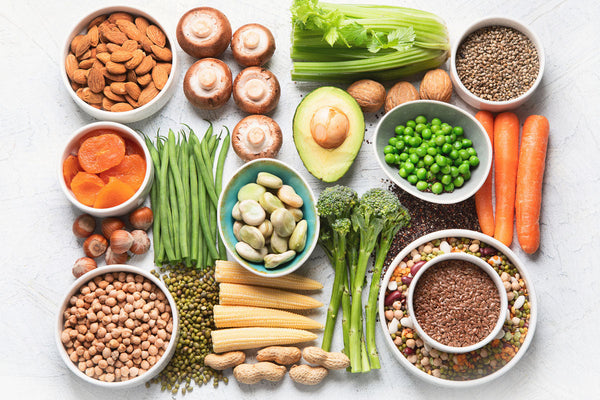Fiber is the carbohydrate portion of plant foods that our bodies can’t digest. But, just because we can’t digest it doesn't mean it isn’t beneficial or important (quite the opposite in fact). Not only does fiber serve an important role in gut health, it may also help you lose weight.
But, not all fibers are the same, as you’re about to see.
Types of Fiber
There are two primary types of fiber:
- Soluble which dissolves in water
- Insoluble which does NOT dissolve in water
How does this affect their roles in the body?
Well, insoluble fibers function mostly as bulking agents, adding content to your stool, while soluble fiber forms a gel-like substance in your GI tract that helps to[1,2]:
- Slow digestion speed
- Reduces your body’s ability to absorb fat.
- Lower cholesterol and blood sugar levels.
- May reduce heart disease risk.
- Increases healthy gut bacteria, which lower inflammation in the body and help you digest better.
Let’s dig a little deeper into the ways that soluble fiber, specifically, supports cardiometabolic health, gut health, and weight loss.
Soluble fiber feeds good gut bacteria
Your gut is home to an estimated 100 trillion bacteria.[3]
Along with other microbes found in your GI tract, these bacteria are often called the gut flora or gut microbiome.
Different species of bacteria play important roles in various aspects of your health and longevity, including:
- Immune function
- Mood
- Cognitive function
- Athletic performance
- Blood sugar regulation
- Weight management
In order to stay strong and healthy, gut bacteria need nourishment. Here’s where soluble fiber comes into play.
While we can’t digest fiber, friendly gut bacteria (probiotics), ferment it and convert it into usable energy.
Fiber intake helps fight inflammation
Chronic low-grade inflammation is known to contribute to a number of lifestyle disorders, including metabolic syndrome, Alzheimer’s disease and obesity. An increasing body of research that gut health may play a pivotal role on our body’s state of inflammation.[4]
Specifically, gut bacteria produce critical nutrients, including short-chain fatty acids (such as butyrate) that can help to reduce inflammation and support a healthy immune system.[5,6]
Observational studies also note that higher fiber intakes are linked to lower levels of inflammatory markers in the bloodstream.[7]
Fiber may reduce appetite
To lose weight, you must be in a calorie deficit where your body burns more calories than it consumes.
Tracking macros and counting calories is effective and can be done quickly and easily with the 1UP Fitness App. Still, many individuals prefer a more intuitive approach to weight loss and don’t want to log every single bite of food he/she takes.
The good news is that it is still possible to lose weight by eating the right foods and getting good at “eyeballing” portions.
The “right” foods include lean proteins, fruits, veggies, whole grains, healthy fats, nuts, seeds, and legumes. These foods are high in micronutrients but lower in calories compared to their hyper-processed counterparts.
Whole plant foods also are significantly higher in fiber compared to boxed/packaged foods. As we mentioned above, fiber helps to slow the speed of digestion, which can increase feelings of fullness and provide a steadier release of energy (carbohydrates) into the bloodstream. Both of these factors help limit overeating and can help decrease your daily calorie intake. Basically, you will be able to lose weight without having to track every single calorie or macronutrient!
Is There a “Best” Type of Fiber for Weight Loss?
Both insoluble and soluble fiber can help you to feel fuller at meal time and support weight loss. However, a special type of fiber, known as viscous fiber has been shown to be particularly helpful at reducing appetite and food intake.[8]
Informally, viscosity refers to a substance’s thickness. More formally, viscosity is a fluid’s resistance to a change in shape or movement. For instance, maple syrup and honey have a higher viscosity than water (i.e. they are slower to pour out of a similar sized container).
Viscous soluble fibers including psyllium husk, glucomannan, pectin, beta-glucan, and guar gum all thicken in water, which help form a gel-like substance in your GI tract that slows digestion and promotes satiety.
A 2012 scientific review concluded that viscous fiber may help to “lower cholesterol for cardiovascular health, improve glycemic control in type 2 diabetes, normalize stool form in both constipation (softens hard stool) and diarrhea (firms loose/liquid stool), and improve the objective clinical measures of metabolic syndrome (glycemic control, lipoprotein profile, body mass index/weight loss, and blood pressure).”[9]
Rich sources of viscous fiber
Viscous fibers occur naturally in plant foods, including:
- Beans and legumes
- Flaxseeds
- Asparagus
- Brussels sprouts
- Oats
One thing to keep in mind is that if you’re currently eating a low-fiber diet, then it’s a good idea to slowly increase your fiber intake over the several days/weeks. Rapidly upping your fiber intake (for example, from 5 grams per day to 20 grams per day) can lead to significant bloating, gas, and GI discomfort.
Also make sure that you increase your water intake on a high fiber diet. Fiber requires more water to digest properly.
Fiber supplements for weight loss
You can fulfill all of your nutritional needs from whole foods, but we live in the real world with real limitations. You may not be able to hit all of your nutritional targets each day, or even track it accurately which is why supplements exist!
Just as you use pre workout supplements, protein supplements, or greens supplements to meet your daily needs, so can you also use fiber supplements.
In fact, research shows that fiber supplements can help with weight loss and weight maintenance![10,11,12,13,14]
1UP Fiber Plus delivers an impressive 7 grams of fiber per serving, from high-quality sources including viscous fibers like psyllium husk! We’ve also included vitamin C as well as heat-stable probiotics (as LactoSpore) to further support gut health and regularity.
For added weight loss support, you may also want to check out 1UP Appetite Suppressant which includes 1,500mg glucomannan (another viscous soluble fiber!) alongside other natural ingredients, including caralluma fimbriata, 5-HTP, and CapsiMax.
How Much Fiber Should I Get?
Health and Nutrition experts recommend 14 grams of fiber per 1000 kcal eaten. This averages out to approximately 25-28 grams/day for women and 35-38 grams/day for men. Unfortunately, actual fiber intake is significantly lower, ranging from 16-22 grams/day in women and 18-26 grams/day in men.
To make sure you’re hitting your fiber goals each day, make sure to emphasize whole foods, and for added reassurance, log your food intake in the 1UP Fitness App which makes it easier than ever to track your macros and achieve your fitness and physique goals!
References
- Erkkilä AT, Lichtenstein AH. Fiber and cardiovascular disease risk: how strong is the evidence? J Cardiovasc Nurs. 2006 Jan-Feb;21(1):3-8. doi: 10.1097/00005082-200601000-00003. PMID: 16407729.
- Myhrstad, M.C.W.; Tunsjø, H.; Charnock, C.; Telle-Hansen, V.H. Dietary Fiber, Gut Microbiota, and Metabolic Regulation—Current Status in Human Randomized Trials. Nutrients 2020, 12, 859.https://doi.org/10.3390/nu12030859
- Afzaal M, Saeed F, Shah YA, Hussain M, Rabail R, Socol CT, Hassoun A, Pateiro M, Lorenzo JM, Rusu AV, Aadil RM. Human gut microbiota in health and disease: Unveiling the relationship. Front Microbiol. 2022 Sep 26;13:999001. doi: 10.3389/fmicb.2022.999001. PMID: 36225386; PMCID: PMC9549250.
- Al Bander Z, Nitert MD, Mousa A, Naderpoor N. The Gut Microbiota and Inflammation: An Overview. Int J Environ Res Public Health. 2020 Oct 19;17(20):7618. doi: 10.3390/ijerph17207618. PMID: 33086688; PMCID: PMC7589951.
- Siddiqui MT, Cresci GAM. The Immunomodulatory Functions of Butyrate. J Inflamm Res. 2021 Nov 18;14:6025-6041. doi: 10.2147/JIR.S300989. PMID: 34819742; PMCID: PMC8608412.
- Campos-Perez W, Martinez-Lopez E. Effects of short chain fatty acids on metabolic and inflammatory processes in human health. Biochim Biophys Acta Mol Cell Biol Lipids. 2021 May;1866(5):158900. doi: 10.1016/j.bbalip.2021.158900. Epub 2021 Feb 9. PMID: 33571672.
- Fritsch J, Garces L, Quintero MA, Pignac-Kobinger J, Santander AM, Fernández I, Ban YJ, Kwon D, Phillips MC, Knight K, Mao Q, Santaolalla R, Chen XS, Maruthamuthu M, Solis N, Damas OM, Kerman DH, Deshpande AR, Lewis JE, Chen C, Abreu MT. Low-Fat, High-Fiber Diet Reduces Markers of Inflammation and Dysbiosis and Improves Quality of Life in Patients With Ulcerative Colitis. Clin Gastroenterol Hepatol. 2021 Jun;19(6):1189-1199.e30. doi: 10.1016/j.cgh.2020.05.026. Epub 2020 May 20. PMID: 32445952.
- Salleh, S.N.; Fairus, A.A.H.; Zahary, M.N.; Bhaskar Raj, N.; Mhd Jalil, A.M. Unravelling the Effects of Soluble Dietary Fibre Supplementation on Energy Intake and Perceived Satiety in Healthy Adults: Evidence from Systematic Review and Meta-Analysis of Randomised-Controlled Trials. Foods 2019, 8, 15.https://doi.org/10.3390/foods8010015]
- Chutkan R, Fahey G, Wright WL, McRorie J. Viscous versus nonviscous soluble fiber supplements: mechanisms and evidence for fiber-specific health benefits. J Am Acad Nurse Pract. 2012 Aug;24(8):476-87. doi: 10.1111/j.1745-7599.2012.00758.x. PMID: 22845031.
- Lambeau KV, McRorie JW Jr. Fiber supplements and clinically proven health benefits: How to recognize and recommend an effective fiber therapy. J Am Assoc Nurse Pract. 2017 Apr;29(4):216-223. doi: 10.1002/2327-6924.12447. Epub 2017 Mar 2. PMID: 28252255; PMCID: PMC5413815.
- https://www.sciencedirect.com/science/article/abs/pii/S2212619817300207
- McRorie JW Jr. Evidence-Based Approach to Fiber Supplements and Clinically Meaningful Health Benefits, Part 2: What to Look for and How to Recommend an Effective Fiber Therapy. Nutr Today. 2015 Mar;50(2):90-97. doi: 10.1097/NT.0000000000000089. PMID: 25972619; PMCID: PMC4415970.
- Jenko Pražnikar Z, Mohorko N, Gmajner D, Kenig S, Petelin A. Effects of Four Different Dietary Fibre Supplements on Weight Loss and Lipid and Glucose Serum Profiles during Energy Restriction in Patients with Traits of Metabolic Syndrome: A Comparative, Randomized, Placebo-Controlled Study. Foods. 2023 May 24;12(11):2122. doi: 10.3390/foods12112122. PMID: 37297364; PMCID: PMC10253086
- Mohammadpour, S., Amini, M. R., Shahinfar, H., Tijani, A. J., Shahavandi, M., Ghorbaninejad, P., Djafarian, K., & Shab-Bidar, S. (2020). Effects of glucomannan supplementation on weight loss in overweight and obese adults: A systematic review and meta-analysis of randomized controlled trials. Obesity Medicine, 19, 100276. https://doi.org/https://doi.org/10.1016/j.obmed.2020.100276






